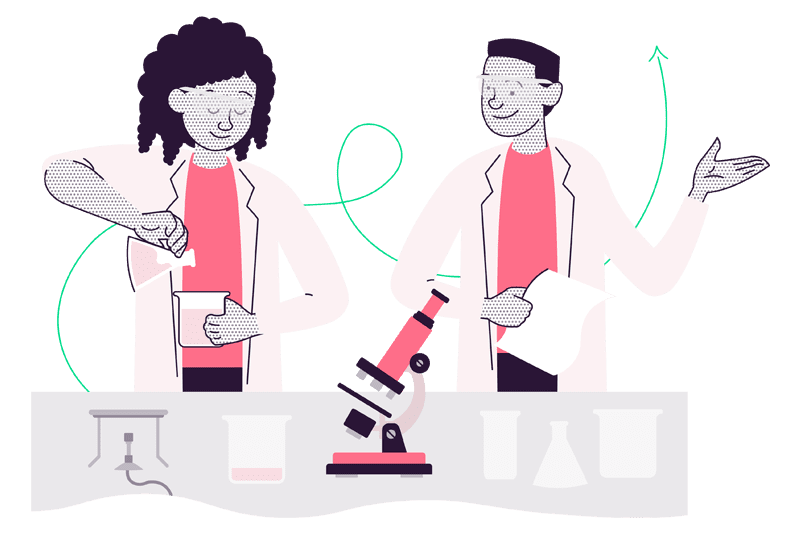Transforming Science Education with Technology
Perhaps more than any other academic subject, science is benefiting most from the application of digital technologies to teaching – and to learning. That’s what Kognity is all about, particularly when it comes to Next Generation Science Standards (NGSS).
Over the last few years, we’ve seen a tsunami of educational offerings and products that provide ingenious ways of bringing digital technologies to the classroom – in disciplines ranging from language arts to world history. But it’s within science classes that new educational technologies are having, arguably, the most dramatic impacts.
As a now-globally-embraced digital education platform that puts quality, curriculum-aligned content at educators’ fingertips, Kognity truel is revolutionizing the way learners engage with interactive content and “take ownership” of their learning.
But interestingly, the more Kognity works with teachers using the platform, the more they’re realizing how technology is going beyond merely being a new kind of delivery method for learning. It is, in fact, enhancing the efficiency and effectiveness of the pedagogy in all sorts of ways.
Access to whole new worlds.
Enjoying enriching educational and interactive videos. Listening to involving podcasts. Going on virtual field trips. Engaging in academic competitions through exciting games. And doing it all via the convenience of smart phones and tablet apps. The best-written and most expertly-edited traditional textbooks don’t come close to the engagement levels students are enjoying on the digital level. In science classes, particularly, and with the inquiry-based approach so crucial to the Next Generation Science Standards (NGSS), technology has become invaluable – making possible, for example, virtual laboratory experiments that are either impossible to stage in the physical environment, or too unsafe or expensive to do so.
Heightening the learning experience for all learners.
We’re all familiar with the three main learning styles: visual, auditory, and kinesthetic. The delivery of curriculum content in the highly engaging multimedia formats that digital technologies allow makes it possible to teach to all three styles.
For visual leaners, high-definition photography, vivid illustrations, colorful and sophisticated animations, and 3D graphic simulations are extraordinarily effective where traditional texts fall short. Auditory learners, meanwhile, can listen to, connect, and converse with both classmates and instructors, as well as absorb material in narrated formats that are more palatable to “listening learners” for whom columns of printed text are uninspiring. And a kinesthetic-tactile learning style requires that students manipulate or touch material to learn: enter Kognity simulations, which develop “hands-on” skills such as building a cell, or performing an experiment in solubility!
Enhancing collaboration.
Importantly, technology enables true collaboration and participation, and promotes inclusivity online, at home, and in school. When students collaborate outside their immediate circle, it establishes the chance for them to share knowledge, exchange ideas, and experience learning opportunities with students and other educators they’d never have the chance to know otherwise. The world, quite literally, becomes their classroom.
All-important digital literacy for the future.
The idea that digital literacy in general is in any way “optional” anymore is absurd – it is a skill essential for college, career readiness, and simple daily life beyond secondary education. By integrating technology into the classroom now, school districts are getting students ready for a life of solving complex problems using technology as a crucial and valued tool, not experiencing it as a hurdle.
Time savings and control for teachers.
With digital learning platforms like Kognity, a teacher can see at a glance what students are reading a particular assignment – as well as how many questions students are answering, how long it’s taking them, and which questions they’re struggling most with. Teachers can set up classes, assign tasks, generate reports of student work, update teacher reports in real time, and monitor individual progress as never before. Surveys and polls gauge student feelings and reactions, and pedagogical strategies can be adjusted accordingly. And of course, Kognity and other educational technologies can first and foremost ease teacher workload by automating repetitive tasks and countless “routine” parts of the teaching process.

Total flexibility.
Science teachers appreciate the options, with platforms like Kognity, of conducting virtual lab experiments, staging scientific simulations as the basis of lessons, and the general richness of content options. And because the Next Generation Science Standards are still relatively new, teachers tell Kognity that they can put together investigations and questions that are aligned to NGSS content to test their teaching ideas – but then add to them, change them, or amend them in the future if they’re not as effective as they might be. And the cross-linking to show connections between various items in the curriculum is something for which digital is tailor-made.
Especially useful for NGSS.
It’s important to remember that the Next Generation Science Standards (NGSS) are written as Performance Expectations that address the three elements of each standard: disciplinary core ideas, crosscutting concepts, and science and engineering practices. To accurately evaluate student progress toward proficiency in any standard, an assessment task must include all three of these elements. One of the biggest challenges in the design of NGSS-aligned evaluations is scripting complex tasks that include science and engineering practices. Technology is a crucial tool for this. Without technology, many performance tasks would be difficult or impossible to implement in any other way.
Blog articles




